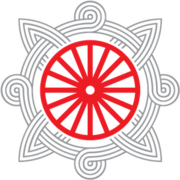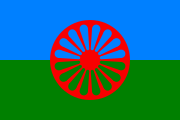
The demographic characteristics of the population of Croatia are known through censuses, normally conducted in ten-year intervals and analysed by various statistical bureaus since the 1850s. The Croatian Bureau of Statistics has performed this task since the 1990s. The latest census in Croatia was performed in autumn of 2021. According to final results published on 22 September 2022 the permanent population of Croatia at the 2021 census had reached 3.87 million. The population density is 68.7 inhabitants per square kilometre, and the overall life expectancy in Croatia at birth was 78,2 years in 2018. The population rose steadily from 2.1 million in 1857 until 1991, when it peaked at 4.7 million. Since 1991, Croatia's death rate has continuously exceeded its birth rate; the natural growth rate of the population is negative. Croatia is in the fourth stage of the demographic transition. In terms of age structure, the population is dominated by the 15 to 64 year‑old segment. The median age of the population is 43.4, and the gender ratio of the total population is 0.93 males per 1 female.

The Romani, also spelled Romany or Rromani and colloquially known as the Roma, are an ethnic group of Indo-Aryan origin who traditionally lived a nomadic, itinerant lifestyle. Linguistic and genetic evidence suggests that the Romani originated in the Indian subcontinent, in particular the region of present-day Rajasthan. Their subsequent westward migration, possibly in waves, is now believed by historians to have occurred around 1000 CE. Their original name is from the Sanskrit word डोम, ḍoma and means a member of the Dom caste of travelling musicians and dancers. The Roma population moved west into the Ghaznavid Empire and later into the Byzantine Empire. The Roma are thought to have arrived in Europe around the 13th to 14th century. Although they are widely dispersed, their most concentrated populations are located in Bulgaria, Hungary, Romania, Spain, and Turkey.

Bukovina is a historical region in Eastern Europe. The region is located on the northern slopes of the central Eastern Carpathians and the adjoining plains, today divided between Romania and Ukraine.
Bunjevci are a South Slavic sub-ethnic group of Croats living mostly in the Bačka area of northern Serbia and southern Hungary, particularly in Baja and surroundings, in Croatia, and in Bosnia-Herzegovina. They presumably originate from western Herzegovina. As a result of the Ottoman conquest, some of them migrated to Dalmatia, from there to Lika and the Croatian Littoral, and in the 17th century to the Bácska area of Hungary.

Parliamentary elections to elect all 151 members of the Croatian Parliament were held on 23 November 2003. They were the fifth parliamentary elections to take place since the first multi-party elections in 1990. Voter turnout was 61.7%. The result was a victory for the opposition Croatian Democratic Union (HDZ) which won a plurality of 66 seats, but fell short of the 76 needed to form a government. HDZ chairman Ivo Sanader was named the eighth Prime Minister of Croatia on 23 December 2003, after parliament passed a confidence motion in his government cabinet, with 88 MPs voting in favor, 29 against and 14 abstaining. The ruling coalition going into the elections, consisting of the Social Democratic Party (SDP), Croatian People's Party (HNS), Croatian Peasant Party (HSS), Party of Liberal Democrats (Libra) and the Liberal Party (LS), did not contest the elections as a single bloc; the SDP ran with the Istrian Democratic Assembly (IDS), the Party of Liberal Democrats (Libra) and the Liberal Party, HNS ran with the Alliance of Primorje-Gorski Kotar (PGS) and the Slavonia-Baranja Croatian Party (SBHS), while HSS ran on its own.
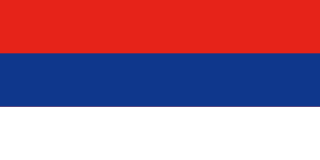
The Serbs of Croatia or Croatian Serbs constitute the largest national minority in Croatia. The community is predominantly Eastern Orthodox Christian by religion, as opposed to the Croats who are Catholic.
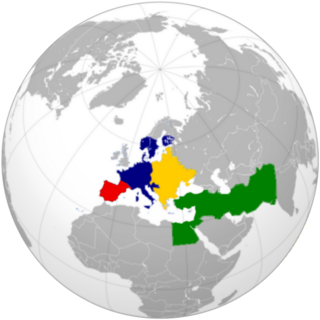
The Kalderash are a subgroup of the Romani people. They were traditionally coppersmiths and metal workers and speak a number of Romani dialects grouped together under the term Kalderash Romani, a sub-group of Vlax Romani.

The Romani people are a distinct ethnic and cultural group of peoples living all across the globe, who share a family of languages and sometimes a traditional nomadic mode of life. Though their exact origins are unclear, central India is a notable point of origin. Their language shares a common origin with, and is similar to, modern-day Gujarati and Rajasthani, borrowing loan words from other languages as they migrated from India. In Europe, even though their culture has been victimized by other cultures, they have still found a way to maintain their heritage and society. Indian elements in Romani culture are almost non-existent, with the exception of their language. Romani culture focuses heavily on family. The Roma traditionally live according to relatively strict moral codes. The ethnic culture of the Romani people who live in central, eastern and southeastern European countries developed through a long, complex process of continuous active interaction with the culture of their surrounding European population.
Minorities in Greece are small in size compared to Balkan regional standards, and the country is largely ethnically homogeneous. This is mainly due to the population exchanges between Greece and neighboring Turkey and Bulgaria, which removed most Muslims and those Christian Slavs who did not identify as Greeks from Greek territory. The treaty also provided for the resettlement of ethnic Greeks from those countries, later to be followed by refugees. There is no official information for the size of the ethnic, linguistic and religious minorities because asking the population questions pertaining to the topic have been abolished since 1951.

Croatia is a predominantly Christian country, with Islam being a minority faith. It is followed by 1.3% of the country's population according to the 2021 census. Islam was first introduced to Croatia by the Ottoman Empire during the Croatian–Ottoman Wars that lasted from the 15th to 16th century. During this period some parts of the Croatian Kingdom were occupied which resulted in some Croats converting to Islam, some after being taken prisoners of war, some through the devşirme system. Nonetheless, Austria strongly fought against the Turks during these few centuries which resulted in the fact that the westernmost border of the Ottoman Empire in Europe became entrenched on the Croatian soil. In 1519, Croatia was called the Antemurale Christianitatis by Pope Leo X in one letter, as well as Poland, Armenia or Albanians.

Parliamentary elections were held in Croatia on 25 November 2007 and for overseas voters on 24 and 25 November. The campaign officially started on 3 November. The President of Croatia announced elections on 17 October and 14 days were allowed for candidate lists to be submitted.

There have been Romani people in Croatia for more than 600 years and they are concentrated mostly in the northern regions of the country.
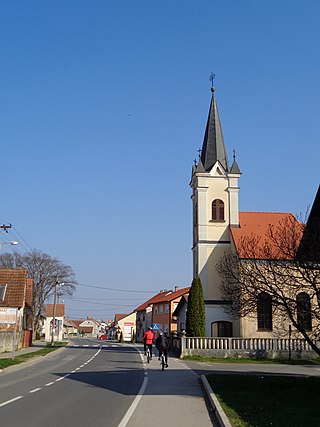
Pribislavec is a village and municipality in Međimurje County, in northern Croatia.

Rivers of Justice is a centre-left political alliance in Croatia. Gathered around the Social Democratic Party of Croatia (SDP), the coalition was originally formed in 2010 as the Kukuriku Coalition. This somewhat facetious name meaning 'cock-a-doodle-doo', taken from a restaurant of the same name in Kastav where the coalition leaders first convened in July 2009, became well known and was eventually taken as the coalition's official name. The coalition originally consisted of four centrist and centre-left parties in the Croatian Parliament: the Social Democratic Party of Croatia (SDP), Croatian People's Party – Liberal Democrats (HNS-LD), Croatian Party of Pensioners (HSU) and Istrian Democratic Assembly (IDS). The coalition won an absolute majority of seats in the 2011 parliamentary election and successfully formed a government led by Zoran Milanović (SDP).

Parliamentary elections were held in Croatia on 8 November 2015. All 151 seats in the Parliament were up for election. This parliamentary election was the 8th since the first multi-party election in 1990 and the first since Croatia joined the European Union in 2013. The ruling center-left Croatia is Growing coalition, led by Prime Minister Zoran Milanović, was challenged by the center-right Patriotic Coalition led by the HDZ and headed by its party chairman Tomislav Karamarko, and also faced several new political coalitions.

The official language of Bulgaria is Bulgarian, which is spoken natively by 85% of the country's population. Other major languages are Russian, Turkish (9.1%), and Romani (4.2%). There are smaller numbers of speakers of Armenian, Aromanian, Romanian, Crimean Tatar, Gagauz and Balkan Gagauz, Macedonian and English. Bulgarian Sign Language has an estimated 37,000 signers.

The Constitution of Croatia in its preamble defines Croatia as a nation state of ethnic Croats, a country of traditionally present communities that the constitution recognizes as national minorities and a country of all its citizens. National minorities explicitly enumerated and recognized in the Constitution are Serbs, Czechs, Slovaks, Italians, Hungarians, Jews, Germans, Austrians, Ukrainians, Rusyns, Bosniaks, Slovenes, Montenegrins, Macedonians, Russians, Bulgarians, Poles, Romani, Romanians, Istro-Romanians ("Vlachs"), Turks and Albanians. Article 12 of the constitution states that the official language in Croatia is Croatian, but also states that in some local governments another language and Cyrillic or some other script can be introduced in official use.
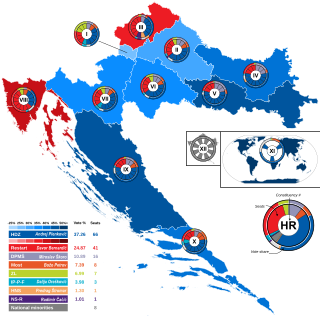
Parliamentary elections were held in Croatia on 5 July 2020. They were the tenth parliamentary elections since the first multi-party elections in 1990 and elected the 151 members of the Croatian Parliament. 140 Members of Parliament were elected from geographical electoral districts in Croatia, three MPs were chosen by the Croatian diaspora and eight MPs came from the ranks of citizens registered as belonging to any of the 22 constitutionally recognized national minorities.
World Day of Romani Language promotes Romani language, culture and education. It is celebrated annually on 5 November, since 2009. Croatian Parliament officially recognized it in 2012 and UNESCO proclaimed 5 November the World Day of Romani Language in 2015. As of 2018, 16 Council of Europe member states recognize Romani language as a minority language under the European Charter for Regional or Minority Languages.
